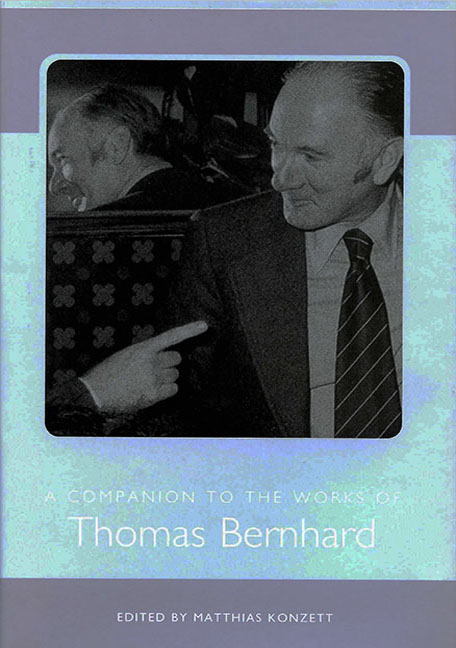Book contents
- Frontmatter
- Contents
- Acknowledgments
- Abbreviations
- Bernhard in the Public
- Bernhard's Poetics
- Bernhard and Drama
- Fragments of a Deluge: The Theater of Thomas Bernhard's Prose
- The Stranger Inside the Word: From Thomas Bernhard's Plays to the Anatomical Theater of Elfriede Jelinek
- Costume Drama: Performance and Identity in Bernhard's Works
- Bernhard's Social Worlds
- Works Cited
- Notes on the Contributors
- Index
Costume Drama: Performance and Identity in Bernhard's Works
from Bernhard and Drama
Published online by Cambridge University Press: 28 April 2017
- Frontmatter
- Contents
- Acknowledgments
- Abbreviations
- Bernhard in the Public
- Bernhard's Poetics
- Bernhard and Drama
- Fragments of a Deluge: The Theater of Thomas Bernhard's Prose
- The Stranger Inside the Word: From Thomas Bernhard's Plays to the Anatomical Theater of Elfriede Jelinek
- Costume Drama: Performance and Identity in Bernhard's Works
- Bernhard's Social Worlds
- Works Cited
- Notes on the Contributors
- Index
Summary
This essay will consider the function of costume and performance in Bernhard's writing, focusing on dramatic works and shorter narratives where items of clothing take on a ritual, even fetishistic role. More particularly, it will discuss Bernhard's short narrative text “Ist es eine Komödie? Ist es eine Tragödie?” that features an unconventional and yet, I will argue, characteristic use of costume. Discussions of what Sebastian Neumeister has called Bernhard's dandyism have shown what store the author sets by codified styles of dress and social behavior. Adolf Haslinger, in particular, has suggested that the obsessive concern with modes of dress has to be understood as a distinctive form of textual behavior, tightly bound to Bernhard's idiosyncratic Sprechgestus (gesture of speech). The writer's attachment to repetitive habits of clothing is seen as a correlative of the narrative act of speech, of patterns of iteration and reiteration. My argument here will consider this correlation more closely by focusing on those types of clothing that are associated in one way or another with acts of transgression, such as imposture, murder, and suicide, which characterize Bernhard's fiction and dramas. Styles of clothing and of speech are conventionally taken as the distinguishing features of a personal identity. Here, though, by their implication in these transgressive acts, they challenge radically the sustainability of any stable notion of identity. In this way, the investigation of identity through clothing performs a key function in Bernhard's ontological and epistemological inquiry.
The essay takes its cue from the alignment of dress and style of writing that Ingeborg Bachmann notes in her draft essay on Bernhard. Bachmann cites, as an example of Bernhard's extraordinary attention to styles of dress, the diatribe from Watten on the profound lack of “Erstklassigkeit” or first-class quality in industrialized clothing. It is, therefore, not by chance that she describes the paradoxical quality of Bernhard's style of writing by analogy with elegance of dress. On the one hand, his is a style which is folded into itself, “sozusagen ein Stil der Unauffälligkeit — nach dem alten Satz, wer am besten gekleidet ist, ist unauffällig gekleidet.” At the same time, it bears the idiosyncratic marks of his “Eigenheit” which Bachmann recognizes in the compulsive repetition of a vocabulary of apostrophe and of terror. If the general style of the writing is one of unostentatious grooming, then these compulsive features also profoundly disturb it.
- Type
- Chapter
- Information
- A Companion to the Works of Thomas Bernhard , pp. 149 - 166Publisher: Boydell & BrewerPrint publication year: 2002

